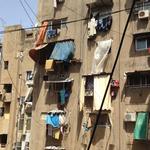Campements, abris et squats: Des zones floues où vivent les réfugiés syriens au Liban (Camps, shelters, squats: Syrian refugees in Lebanon’s twilight zones)
In Lebanon, self-settled Syrian refugees live under very difficult, poor and unsanitary conditions in camps, shelters, and squatted buildings. The majority have limited spatial mobility to the degree of women and children not leaving their homes. Mobility is hence highly circumscribed and delimited to avoid social stigma, detection and arrest due to expired or invalid residency permits. Shunned by majority society, refugee families endure forced residential immobility living in urban interstices of various types. There is therefore a connection between the lack of rights and the informality of residence in urban twilight zones. To this end, the paper examines how socio-legal borders shape the lives of Syrian refugees in three urban "heterotopia": informal Palestinian camps (Tyre), formal and self-organized shelters (Sidon), and derelict buildings (Beirut).







